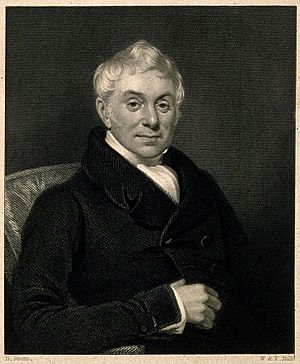Thomas Copeland facts for kids
Thomas Copeland (born 1781 – died 19 November 1855) was a very important British surgeon. He made big changes in how certain diseases were treated.
Contents
Early Life and Training
Thomas Copeland was born in May 1781. His father, William Copeland, was a church leader in Byfield, Northamptonshire. Thomas started his studies with Mr. Denham in Chigwell, Essex. Later, he moved to London to learn from his uncle, Edward Ford, who was also a surgeon.
Becoming a Surgeon
Thomas continued his medical training at famous places like the Great Windmill Street School and St. Bartholomew's Hospital. These were important schools for doctors back then. On July 6, 1804, he officially became a member of the Royal College of Surgeons. This meant he was a qualified surgeon.
Army Service
Just a few days after becoming qualified, on July 14, 1804, Thomas Copeland joined the army. He became an assistant surgeon with the 1st Foot Guards, a famous army regiment. He traveled to Spain with his regiment under a general named Sir John Moore. Thomas was present at the Battle of Corunna in 1809, a major battle during the Napoleonic Wars.
A New Kind of Doctor
After serving in the army, Thomas Copeland returned to England. His uncle, Edward Ford, was retiring, so Thomas took over his medical practice at 4 Golden Square in London. He also became a surgeon at the Westminster General Dispensary. Soon, he became very popular, especially among important families in London.
Specializing in Surgery
In 1810, Thomas Copeland published a book called Observations on some of the principal Diseases of the Rectum. This book was very important because it introduced new and scientific ways to treat these specific diseases. Because of his work, he is often called the founder of "rectum surgery." Many people in London sought his advice for these kinds of health problems.
He also came up with a clever way to fix problems inside the nose. He designed special tools to help people breathe better when their nasal passages were blocked.
Other Important Works
Thomas Copeland also wrote another important book in 1815 called Observations on the Symptoms and Treatment of the Diseased Spine. This book focused on problems with the spine, especially in their early stages. It was so well-regarded that it was translated into several other languages.
Later Life and Achievements
Thomas Copeland was recognized for his contributions to medicine. On February 6, 1834, he was chosen to be a Fellow of the Royal Society. This is a very high honor for scientists and researchers. In 1843, he became an honorary Fellow of the Royal College of Surgeons.
He was also a member of the council for the College of Surgeons. In 1837, he was appointed surgeon-extraordinary to Queen Victoria, which meant he was a special doctor to the Queen.
In 1842, he moved his practice to 17 Cavendish Square. However, his health started to decline, so he began to work less.
Death and Legacy
Thomas Copeland passed away from a liver illness called jaundice on November 19, 1855, in Brighton. His wife died shortly after him. He left a large amount of money, giving £5,000 each to charities that helped orphans of church leaders and families of doctors.
 | Georgia Louise Harris Brown |
 | Julian Abele |
 | Norma Merrick Sklarek |
 | William Sidney Pittman |


